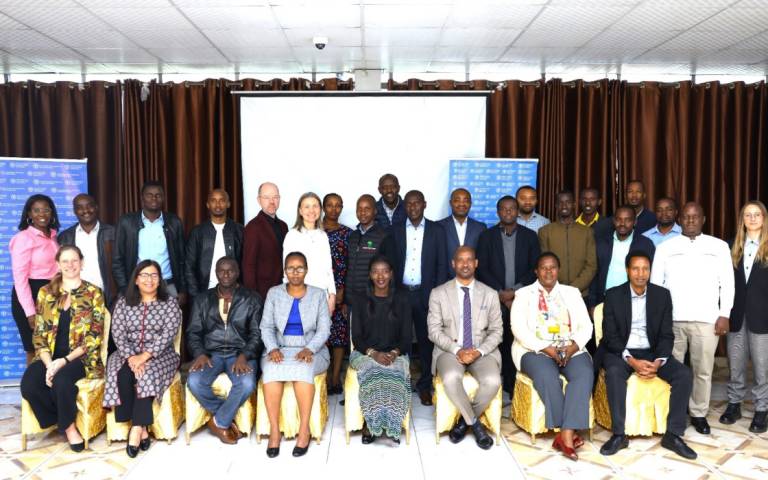UCL IIPP launches an applied learning programme with UN FAO and Rwanda’s Ministry of Agriculture
13 November 2023
IIPP is working with the UN Food and Agriculture Organisation (FAO) to deliver a new training programme for policymakers in Rwanda to support the Ministry of Agriculture and Animal Resources (MINAGRI) on the transformation of food systems.

IIPP new training programme for policymakers supports the Rwandan Ministry of Agriculture and Animal Resources (MINAGRI) in adopting systems approaches and transformative policy tools for transforming agri-food systems towards the Sustainable Development Goals.
The training, led by IIPP Deputy Director Prof. Rainer Kattel and IIPP Associate Professor Dr. Kate Roll, with contributions from Prof. Alfred Bizoza, Associate Professor in Agricultural Economics, University of Rwanda, has taken place in Musanze, Rwanda, over 5 days and is involving 30 senior and technical experts from various government departments, including Rwanda Ministry of Agriculture, Ministry of Health, Ministry of Environment and Ministry of Finance, alongside FAO country representatives and other local stakeholders.
The programme has been co-designed with the partners over the last few months to adapt how system thinking and challenge-based policy approaches can be applied to the Rwandan food system context. The aim is to equip policymakers with system tools to help design new strategic policies that have transformative outcomes.

Technical experts and policymakers from various government departments during the IIPP applied learning programme to support the Rwandan Ministry of Agriculture and Animal Resources.
Recent decades have brought increasing evidence of the contribution of food systems to economic and social development. As food systems have undergone changes, various positive inter-linked effects have been recorded around developing countries: markets for small farmers have grown; poverty has declined; off-farm employment opportunities have increased, including for women and young people; export earnings have risen; and agricultural innovation has proliferated.
Rwanda has led the field in incorporating this thinking into its policy development, especially following the 2021 Food Summit. Yet, the country still faces significant vulnerability to climate change, high food inflation, stagnating land productivity, and high levels of food insecurity and malnutrition.

IIPP Associate Professor Dr. Kate Roll delivers the applied learning programme to expert and policy makers from Rwanda Ministry of Agriculture, Ministry of Health, Ministry of Environment and Ministry of Finance, alongside FAO country representatives and other local stakeholders.
What tools, approaches, and practices can support the government in addressing some of the more systemic and underlying challenges? The sessions in the training cover systems thinking theories and practice, challenge-oriented policies and policy design, and how to build suitable capacities and capabilities in the public sector. Group exercises facilitate the implementation of the concepts learned in the real context.
At the launch on Monday, 27 November 2023, Dr Chantal Ingabire, Director General of Planning for the Ministry of Agriculture and Animal Resources, opened the programme outlining the objective to ensure that policies create conducive conditions for impactful investments in agriculture and food systems, contributing to the nation's economy.
IIPP Deputy Director Rainer Kattel said:
Over the past six months, we have had excellent discussions with UN FAO that have led to developing a policy learning programme for food system transformations. We are excited that we are launching this programme with Rwandan policymakers. Empowering a wide variety of policymakers to co-design transformative policies helps build long-term capacity that is key to development.
After the delivery of this training, IIPP will continue to work with UN FAO to design a course that could be delivered in other countries.
 Close
Close

